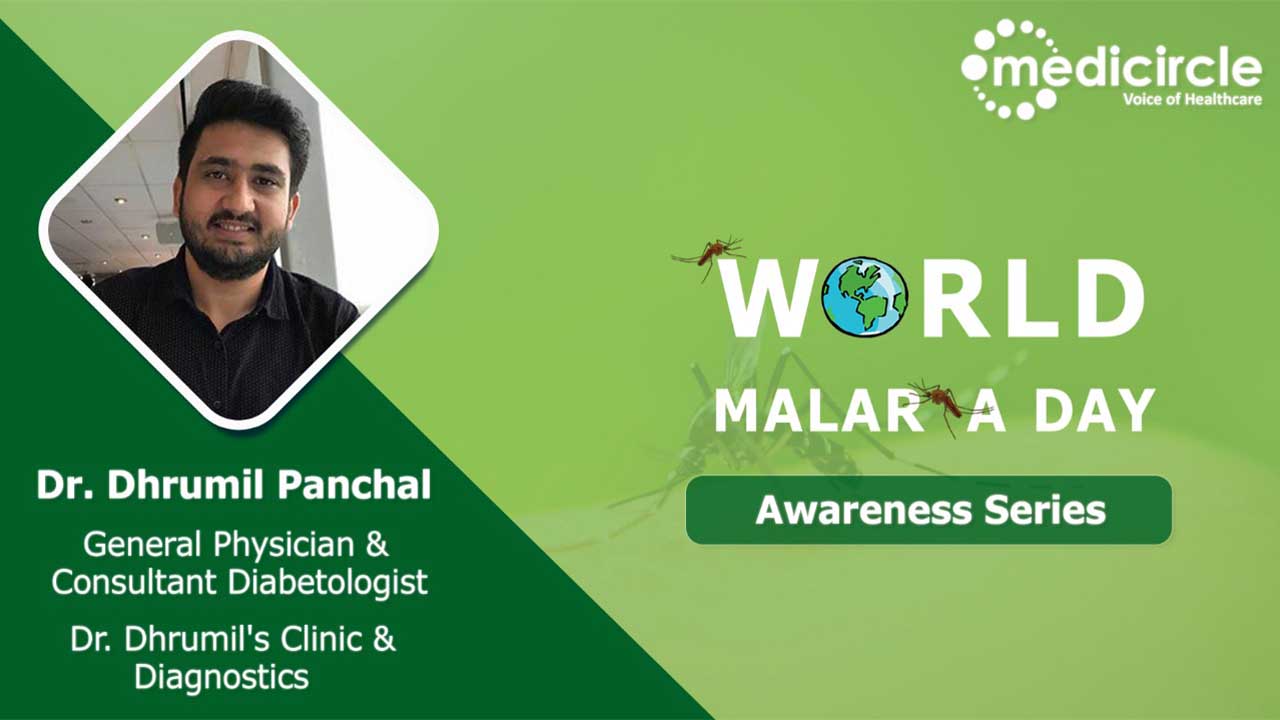The World Malaria Day is observed annually on 25th April to bring global attention to the efforts being made to end malaria and bring about change to eradicate malaria completely. The WHO has noted impressive gains by India in the fight against malaria. According to its report, most malaria prevention campaigns were able to move forward this year without any delays in spite of the COVID 19 pandemic. India recorded the largest reduction in malaria cases in Southeast Asia from 2000 to 2019. India has contributed to the largest drop in cases nationwide from 20 million to 6 million. In spite of the outstanding achievement by India in cases of malaria, strict intervention is needed to eradicate it completely from India. At Medicircle, we're conducting a series on Malaria with eminent doctors for World Malaria Day to boost awareness and educate people about the prevention from it.
Dr. Dhrumil Panchal is an experienced skilled and awarded doctor in his field of specialization. He's a well-known doctor based in Mumbai who specializes in the field of Medicine with special clinical expertise in treating patients successfully. He has over seven years of experience practicing Medicine in various Hospitals and Clinics. He is currently associated with Dr. Dhrumil’s Clinic and Diagnostics. He specializes in skin allergies, allergy treatments, viral fever treatment, insulin-free treatment, diabetes management, irritable bowel treatment, and so on. Beyond affiliation with many hospitals, Dr. Dhrumil has been professionally active in many other ways too.
Be extra careful in morning and evening
Dr. Dhrumil informs, “Malaria is mainly caused due to mosquito bite. Other reasons like blood transfusion also cause malaria but it's very rare, we can call it 0.01% chances. Malaria mosquitoes especially bite during sunrise and sunset time. So, people can take precautions specifically during the dusk and dawn.”
Common Signs of Malaria
Dr. Dhrumil mentions, “The main signs and symptoms of Malaria is fever are-
- Fever will be intermittent like on and off
- Fever with shaky chills is the most common symptom we see in maximum patients
- Fever will be very high above 100 -101 degree Celsius associated with shivering and sweats
- Other symptoms that the patient may complain of are body ache, muscle ache, weakness, tiredness, and headache.
So, these are the symptoms we see for malaria parasite test.”
Avoid getting a mosquito bite
Dr. Dhrumil suggests, “The only precaution we can take is to avoid getting a mosquito bite. We can use mosquito repellents, use Odomos, use drops that can prevent you from mosquito bites, using mosquito nets, and closing all windows, especially during morning and evening time. And if you have any of the symptoms, do visit the doctor immediately and get evaluated. If Malaria is treated early, it is not fatal. But if the treatment is delayed then it can be very dangerous and can get many complications.”
Treatment of Malaria is available
Dr. Dhrumil expresses, “We have got the Malaria treatment. There are four types of malaria of which Vivax and Falciparum are the dominant ones. So, depending upon the type of malaria, initially, we start with the medicines, Artemether and Lumefantrine. Then we can go for I.V injection Artesunate. Treatment also depends upon the platelet count, CBC, index of Malaria, whether to treat a patient at home or need to be admitted. In countries like the US, patients with Falciparum (the deadliest type) need to be admitted to the hospital whereas in India because of our good immunity, even falciparum infections are treated at home itself.”
Doctor’s Advice
Dr. Dhrumil says, “My only advice to the patient will be if you have any symptoms of fever, do visit the doctor. They will evaluate and perform certain tests. And then if you are Malaria positive, nothing to worry about. You will be given medicines and told to do a blood test like CBC every two days to evaluate the platelets count. Depending on that, the treatment will be done later. So, early diagnosis is very important.”
(Edited by - Renu Gupta)

 ''Malaria is a curable disease. Indians have good immunity against malaria and can be treated at home depending upon their condition'' says Dr. Dhrumil Panchal, General Physician and Consultant Diabetologist
''Malaria is a curable disease. Indians have good immunity against malaria and can be treated at home depending upon their condition'' says Dr. Dhrumil Panchal, General Physician and Consultant Diabetologist









.jpeg)

.jpg)







.jpeg)

.jpg)




.jpg)




.png)

